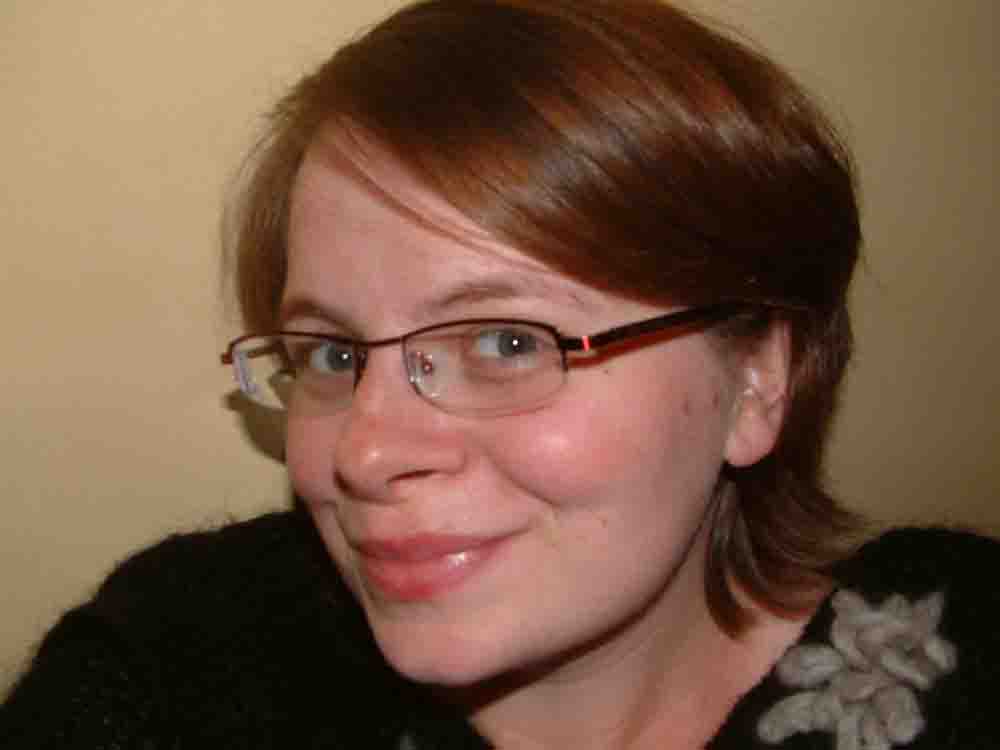Wednesday, May 31, 2006
Striving to Shine- Gatoto Community Primary School
Gatoto Community Primary School, in the Mukuru Kwa Reuben area of Nairobi, is in the heart of the city’s industrial area.
For the children that go there, it is a somewhat of a sanctuary.
The industrial area is noisy, cramped and very very polluted. Walking to the school I pass a river, once a muddy brown, now an indigo blue, dyed from the washout of the surrounding factories. The fumes and stench choke. Channels of mud and raw sewage run right through the main ‘street’. A single step brings you through it all; over mango pips, rubbish, wrappers, dust and layers of it. The main thoroughfare is lined with all forms of small kiosks, each decked with variants of rusted corrugated iron. I see a young boy asleep in a wheelbarrow, another plays with a scissors. It’s a busy, bustling place. I am told the population of the slum is about 100,000, but again, no one can really get an accurate estimate.
In the heart of all this though lies Gatoto. A large open space, with trees, school buildings, a library, sanitation, and a genuine welcome. I am back to visit after two years, to say hello to the staff and pupils. I feel it fitting that my journey commenced in Nairobi, for it was really this school and the people who make the magic of it happen, which started me thinking about this project.
I arrived just in time for athletics training. There was a competition on the following day, and the kids were in serious preparation mode! They take their sports very seriously at Gatoto… and their singing… and their education.
The woman behind Gatoto is a dynamic lady called Betty Nyagoha, who has been working with the school since 1994; developing the grounds, the teachers and the pupils. Today enrolment is 990 pupils, and exam grades are improving each year. The underpinning ethos of Gatoto is a belief in the ability and potential of every child; and it is not just lip service.
Over lunch I sit outside with the school’s social worker, Rhonda, and she starts to tell me stories about each of the children as they pass by. One boy in Grade 8 had disappeared for 6 months. After a tip-off, Rhonda found him living on the streets in Nairobi. Domestic issues forced him to run away but after meeting with the family, Rhonda was able to help alleviate some of the family issues and the boy returned to school. That was just the first of many similar stories.
At two o’ clock the bell rings for the afternoon classes. At that time the main yard is still buzzing with the smaller children (the ones who only have morning classes). Rhonda tells me that the kids stay around school because there is no where else safe for them to play. Without Gatoto, she is not sure what these kids would do. With that, she turns around and tends to a child who has fallen and cut his knee.
The Gatoto model may not be changing the ways education operates in Kenya, but one thing for sure is that it is changing the lives of the pupils who attend. And perhaps the visitors too.
WORTH for Women- Marcia Odell Explains.
Marica Odell is firmly committed to the worth of women, so much so that she has devoted her recent years to setting up WORTH- A Global Initiative for Women’s Economic Empowerment, Africa division.
WORTH started out 8 years ago in Nepal. It is a programme which through literacy training, local savings schemes and micro enterprise development, helps women to develop themselves, their families and their communities.
In a pilot project in Nepal with 125,000 women, literacy rose from 39,000 to 121,000 in the space of just two years. What’s more, the women collectively saved over $1million and the money raised was used to start over 66,000 small businesses. And that was only the pilot.
Maria explained what is unique about initiative;
‘Worth is about helping women to discover how powerful they really are and the resources that have. There is no external money coming in, by a mirco finance institution. It is women being in charge of their own money’.
According to Marcia, when WORTH was starting out there was a lot of skepticism within the development community towards the model, as people believed external institutions were necessary in mirco-finance initiatives. The success of the model to date has proved otherwise.
It was a key lesson for Marcia. Understanding that inventions and innovations happen by not following standard models, she is now more comfortable with taking risk.
Life for Marcia has been a mixed bag of academia, motherhood, consultancy work, entrepreneurship and international development. While raising two children in the States, Marcia wanted a job that could fit around the school hours, and so designed one which suited her. She always had an interest in early childhood development (and has a Master’s degree to back it up), and so went about setting up a Toy Company which specialized in learning toys for kids. She has been able to apply the same business skills she learned then, to her current work.
Interestingly Marcia, who also has a PhD from Cornell University and an MBA, has had to ‘undo’ some of her academic training. Listening she admits is something she has had to learn, ‘it is much easier to talk than it is to listen’ she explains. ‘In a PhD programme, it is all about articulating ideas. I actually found that the training I received in my academic programme may not be the most productive way of engaging with people. Talking about successes and what we can learn from them, rather than analyzing and tearing them apart is’. But this, she explained, was is very recent learning for her.
WORTH has plans to roll out across Africa. Already it has programmes in Congo, Kenya, Tanzania and Zambia. For Marcia, she knows that there is a huge amount more work to do, but knows to that this is where she wants to dedicate her time. An hour after our meeting she was heading off to Mali to see what could be done there…
Monday, May 29, 2006
Sun, Moon and ... Water Pumps? Meet Nick Moon.
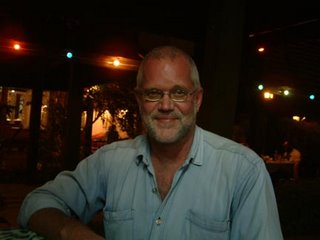
I had been looking forward to meeting the people behind Kickstart since I started out planning this project a few months back, and I finally got to catch up with Nick Moon, one of the co-founders, on Saturday night.
Kickstart’s starting point is tackling the root cause of poverty- a lack of money. Over the past 16 years they have developed low cost equipment which can be used to ‘kickstart’ new businesses. They have an oil press, which can be used to extract cooking oil from seed, a building block press, and the most successful product to date, a manual water irrigation pump- otherwise known as ‘The Money Maker’. In 2003, the pump was named one of Newsweek’s ‘Ten Inventions That Will Change The World’. The figures which capture their impact are very impressive;
43,000 new businesses have started.
700 new businesses start up each month.
Generating over $40 million per year in profits and wages.
Revenues from these businesses represent 0.5% of Kenya’s GDP and 0.2% of Tanzania’s.
Nick is firm believer in market-based solutions to poverty, and is convinced that simple technologies can lift people out of subsistence, day to day living. The profits generated by the families which use the pumps allow them to plan for the future, look after their health, educate their children, and encourages people back to the rural areas from the urban slums. One woman also reported a better relationship with her husband! The fact that the pump does not need fuel or electricity is yet another bonus.
For Nick though it has been a interesting road to get to where he is now, and one which he emphasised was riddled with PERSISTENCE. Growing up in Calcutta, Nick was aware of the ‘have’ and ‘have not’ divide that exists from a very early age. He then moved on to Singapore, and went to boarding school in the UK. It was there that he developed an interest in artisan crafts, and upon leaving school, decided to become a craftsman, specifically a wood carver. ‘But I was too impatient’, he joked, and so he moved into the building trade. He went on to set up a business in the UK, and following a few years of intense learning about how business operates, he got itchy feet. Seeing a chance advert in a paper for a ‘French speaking builder’, he responded, and ended up in Togo. That later led to a three year stint as a VSO (Voluntary Services Overseas) volunteer in Western Kenya. It was there that he started to understand what life in rural Africa was really like- including the needs, the issues, and the solutions. Those years were the basis for his current work, and he greatly appreciates his years with VSO.
Jump ahead a few years and he ends up working with Action Aid Kenya. He had been designing some basic building block presses for Action Aid, when he fortuitously met Martin Fisher, a Stanford engineer, who frankly told Nick that the design of the press was terrible! There followed a most productive, honest partnership which resulted in the establishment up of Kickstart (originally called ApproTEC).. and the rest is indeed Making Poverty History!
But to Nick this is just the beginning. ‘What we have is not enough, you have to have the numbers, you can’t just have nice little stories. If it is going to have real significance difference, on a large scale, it has got to be hundreds of thousands’. And that is indeed their plan. Kickstart currently operates in Kenya, Tanzania and Mali and have an expansion plan in place to roll out over the next few years. The day after I met him, Nick was heading down to South Africa to investigate options there.
Nick and Marin recently featured in a documentary series called ‘The New Heroes’. Google their names and you will find a number of other awards and prizes in recognition of their contribution.
A Tale of Two Cities- Side Two of the Coin
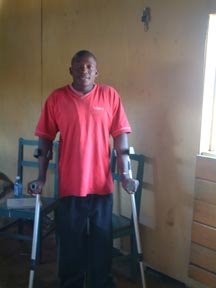
Kibera is one of Africa’s most notorious and worse urban slums. Anyone that saw ‘The Constant Gardner’ which was filmed there, will be familiar with the scene; shanty town, open sewers, incessant noise and constant bustle. A rough count puts the population at 1 million, but with people migrating in from the rural areas daily, it is impossible to get an exact figure. Poverty under any guise is not a pretty site but urban poverty in developing country settings has to be one of the worst. When I entered Kibera via one of the main bus stations, I was told that I was in the ‘posh’ part of the slum. Small businesses conjugate around the station; tailors, auto repairs, food stalls- all bringing a bit of buzz to the place, but apparently it is not so the further in one goes.
I went to Kibera to meet a very interesting young lad, Fred Ouko, who is the director of Kibera Community Youth Programme. KCYP, do a number of things all centred around mobilising youth in the community to engage in their personal and community development. They run drama and music workshops, community clean-ups, and health education. They are not is in the business of handouts. Fred kept stressing the word, ‘sustainability’. He wants an organisation which can generate its own income and to do this he is looking at business models which can do this- already some of KCYP’s participants make jewellery to sell in local markets. The income generated can both provide salaries for the young people and a small percentage be channelled back into the organisation.
I asked Fred about what the Kibera Community think of mass influx of donor aid which has come in to the area- ‘Fatigue; they are tired’, was his immediate response. Fred commented on the fact that there has been little visible difference in the area, and that the local residents ‘feel used’; targets of camera lens, whose pictures end up in glossy reports about how their life should be different.
But Fred is not one to sit back and moan. He is passionate about the young people in his community, and firmly believes that they have potential to shift their circumstances. His other passion is putting youth with disabilities on the international development agenda, believing that they have been ‘left behind’. Fred himself suffered from polio at a young age, and as a consequence requires crutches to walk. With no proper pathways and crazy traffic, it is difficult getting around Nairobi at the best of times, so I could certainly see where he is coming from!
It is early days for Fred, as he tries to figure out the best sustainable models for KYPC, but I have every confidence that he is on the right track.
A Tale of Two Cities- Side One of the Coin
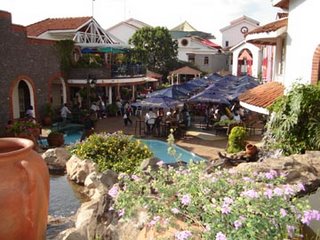
Over the past few days I’ve been getting look at both sides of Nairobi’s coin. The rich and the poor- and the difference is stark.
Nairobi is awash with cash. I am not just talking about the white and Indian populations, but a growing black middle class. Affluent and Africa are not two words I normally associate, but I do here. Plush cinemas, restaurants and shopping malls are springing up all over the city. Golf links, spas, and casinos are not uncommon. From what I can see, everyone has a mobile phone. There are private schools which cost $15,000 per year in tuition fees. In a city where the average monthly earnings are between 10,000 and 15,000 Kenyan shillings a months (about $20), and with an unemployment rate of about 40%, I find this intriguing.
I went to ‘Village Market’ yesterday, (a shopping centre fancier than anything I have ever seen in Ireland), to meet a young lady called Judy who works in one of the coffee shops there- and admittedly I was taken aback. The queue for espressos, double lattes, decaf cappuccinos, skimmed hot chocolates (what is the point in that?!), was a continual ten deep. I asked Judy if it was always this busy, and sure enough it is. We had to postpone our chat until another day, when she has some time off and does not have to attend to the queue.
This is not the image of Africa which is projected in the media. But this is a genuine lifestyle for a large number of people here. There is a new confidence in the city too, which I did not sense to the same degree on my last visit here two years ago. Much of this is due to a decrease in the crime rate. The police have cracked down, and as a result more people venture out, and spend more. The streets are busier at night, and the place generally has more of a buzz to it. There is a hell of a lot more traffic too, but that’s another story.. in the meantime, cappuccino anyone?
Friday, May 26, 2006
Press Play- Jambo from Nairobi
The shift from ‘I plan to’ to ‘ I am doing’ has happened.
Venturing through the departure gates in Dublin airport, is venturing on a path I have chosen to take, which I planned for, which excites me. Funny when you visualise something for so long, and wham, bam, you press play and the film starts to roll.
Cue Nairobi- first port of call.
Of all the destinations en route, it is one which nerves and excites me in about equal measure. Nairobi, aka, Nairobbery. We’ve all heard the stories, and despite being here before, it is a place I am anxious about. Gut instinct tells me to be so. But the familiar settles also settles me. Arrival anxieties were quickly dispelled, when I was met at the airport by an old pal, Joseph Ngigi. Jovial and efficient, Joseph runs a small taxi company, and runs it exceptionally well. If you ever need a taxi driver in the city, he is your man! (I’ll post his contact details shortly). On the journey from the airport, we catch up with news. I tell him about my project, and already he is brimming with ideas and introductions he can make for me. The journey has only just begun, but is already taking on new dimensions and aspects, with two on the most essential ingredients; trust and connections.
Wednesday, May 24, 2006
Up, Up and Away!
Departure is imminent. Nairobi looms. Bags almost packed. This time tomorrow I will be in Kenya! Given the interviews that are lined up, the journey, part 1, is promising to bring interest and insights. Excitement mounts.
From here on out I’ll try to update the blog at each main stopover- internet connections and electricity permitting! Again, if you have any suggestions or contacts for people I could meet up with along the way, please email:
exceptional.lives@gmail.com
'Because I can!'- Who is Frank Buckley?

I think it is fair to say that Frank Buckley is somewhat of a maverick. Growing up on the streets of Dublin (literally), he knew all to well that life on the margins was really like. With little experience of formal education or institutions, he learned to figure out things for himself. Normal rules and systems don’t really apply to his way of thinking!
Street life led him into some ‘interesting’ situations, but eventually, following a stint in rehab, he realised he had a choice- either live or die. He took the former and since has indeed been making the most of it.
Frank now runs an organisation called SARI (Sports Against Racism Ireland), which aims to promote intercultural understanding through sport.
Off all the interviews I have had so far, one of the most striking comments came from Frank. When I asked him why it is he does what he does, he said, ‘I do it because I can’, and then repeated, ‘I do it because I can’.
Simple as that.
Tuesday, May 23, 2006
Coffee with a Conscience- Who is David McKernan?

Starting out on this project, I wanted to meet a wide range of individuals working for social change in all sectors, including business. In Ireland, the name Java Republic Coffee Company kept cropping up. The man behind it is David McKernan.
David is a hard core business entrepreneur. Leaving school, he went straight into a successful career in one of Ireland’s main coffee retailers, Bewley’s, and there learned the trade. After 12 years he knew it was time to venture alone, and so went on to set up Java Republic Roasting Coffee Company in 1999. With the tag line, ‘Coffee with a Conscience’, Java Republic is one of the fastest growing coffee brands in Ireland. It has been a tough road to get where he is, but the business is now booming. With a current turnover in excess of 6 million a year, David is still plotting expansion. The growth is impressive, particularly considering that he started out at the kitchen table, and nearly lost his house along the way. He admits to making every mistake in the book, but he kept going.
A three week trip to India in 1994 brought the ‘social’ dimension to his entrepreneurial streak. ‘Before the trip’, he said, ‘I had no idea what was going on. I may have gone through Live Aid, but I had no idea of the issues; I didn’t understand the poverty, I didn’t understand the social needs. So when I went to India, I got the shock of my life’. Arriving in Bombay, David wanted to visit a local hospital to see what the conditions were really like – but he never made it. Having to step over bodies to get in, he eventually could go no further, ‘I just couldn’t believe that people live like this’, he said. It was a trip which proved to be a pivotal moment in his business career. ‘I actually just realised then that there was something else to life which I had never before realised. That trip was the biggest change to me’.
David is currently in the process of establishing the Java Republic Foundation in which 11% of the company’s profits will be directed to assisting communities in the regions in which his coffee is grown. In addition, 35% of his coffee is sourced from fairtrade channels, which he is keen to bring to 100%- without jeopardising the quality of the coffee. He is also an advocate of the coffee co-operative movement. To him, it is not enough that the farm owner gets a fair deal, but the farm workers should also be guaranteed a fair wage and conditions. The co-operative movement is one way to approach it, ‘a way to ensure that everyone is being looked after’.
But to David, it is not about ‘do-gooding’, he knows his approach makes business sense. ‘I want to know that our business is based on sound principles’, he asserts, ‘I don’t want anyone every to be able to say that Java Republic is screwing the producers; the small farmers who collectively put our coffee into the market place’.
Don’t be mistaken though; he loves money. He takes regular holidays abroad with his family, has a beautiful house, fancy car- all the trappings which his monetary success had enabled.
I asked him what were some of the key attributes to get him where he is today- Never taking ‘no’ for an answer. Focus. Persistence.
However it is not all work. Keeping healthy is a particular passion and David is a fanatical sports fan. When I met him, at 8am, he had already been up for 4 hours, which included a visit to the gym!
What did I find most interesting about David? Mostly his confidence. It seems that despite the knocks, it is his confidence in his ability to succeed which keeps him buoyant. ‘Is there anybody you would like to meet?’, I asked him, ‘No, because if there was, I would have picked up the phone and called’. ‘Is there anything you would like to do next?’, ‘Not really, I’m already doing it’. ‘Is there anything you have to learn?’, ‘Humility’!
Monday, May 22, 2006
So what makes a Social Entrepreneur?
Good question, which I am frequently being asked. One of the best answers I have heard came a couple of months ago at the Skoll Forum on Social Entrepreneurship when Jeff Skoll, founder of the Skoll Foundation, provided a most amusing, but apt, adaptation of Stephen Covey's 7 Habits of Highly Effective People with:
The Seven Habits of Highly Effective Social Entrepreneurs:
1. EXPERIENCE A PROFOUND SENSE OF HEARING LOSS (in that they generally don't take 'no' for an answer, or 'can't' as an excuse).
2. ARE 'A' STUDENTS NOT AFRAID TO GET 'Fs'. Social entrepreneurs learn that failure is part of the package.
3. KNOW WHEN TO BOIL THE CLOTHS. Florence Nightingale was one of the most well know social entrepreneurs of her time- but she knew that it was not always about big plans and schemes. When it was 'roll up your sleeves' time, she was there, boiling the cloths, and knuckling down.
4. INHABIT LESSER ZONES OF GRAVITY. Social entrepreneurs learn how to do more with less.
5. HAVE THE ABILITY TO MAKE MOLEHILLS OUT OF MOUNTAINS.
6. HAVE X-RAY VISION. They can see to the core of an issue.
7. ARE PYROMANIACS AT HEART. They can set a room on fire. As one social entrepreneur once said to Jeff, 'I am on fire because I've got mountains of ice to melt'.
Thursday, May 18, 2006
The Business of Community- Who is Tina Roche?
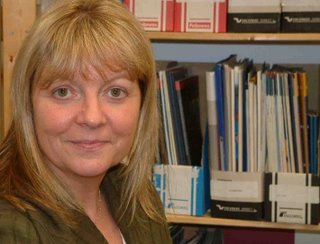
Tina Roche loves lots of things; art, advocacy, business, children, family, humanity. She has let those passions guide and direct her decisions in life. They have led her to do many things including becoming the treasurer of Amnesty International Ireland, a mother of one, a foster mum of three, the lead fundraiser for the Millennium Wing of the National Art Gallery of Ireland, and currently the CEO for both Business in the Community Ireland (BITCI) and The Community Foundation for Ireland.
On the walls of BICI is their mission statement, posted proudly to remind all those involved of the track they are on.
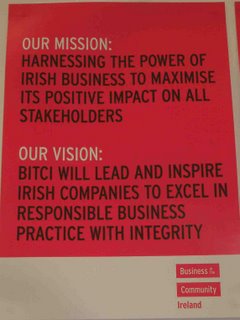
With the Community Foundation of Ireland, Tina’s aim is to channel €100m over the next 10 years to community based organisations in the country which are promoting issues such as social inclusion and civic leadership.
Tina’s main influence comes from her father. He was a man of great integrity and was constantly involved in community activities. Tina was also the eldest of 6, and grew up minding her siblings, and frequently her neighbour’s kids. Running ‘messages’ for the neighbours was part of her upbringing.
Her father was heavily involved in setting up St. James’ Street Credit Union and by the age of 17, Tina was a regular volunteer. However, she didn’t see it as volunteering- just part of everyday life.
To Tina, Corporate Social Responsibility (CSR) is so much more than simply community involvement; it is about how businesses conduct themselves as a whole. ‘It is about it is about getting your staff motivated about things that they like’, she elaborates, ‘imagine if you work for a business which is inspiring. Instead of just producing a drug, it was about curing AIDS- a business which is about the health of a nation, not just about making money for shareholders’.
Tina also sees the value of breaking down into simple actions and gave some practical examples of how we can change work behaviour. ‘Mobile phones and chargers’, she comments, ‘everybody keeps their charger at work, plugged into the wall and on. It is used for 5 percent of the time, and 95 percent it draws power for no reason. So just pull it out and turn it off. Also, things like pens are always half used. Very rarely do you actually discover that you have finished a pen!’
So to Tina, it is small, accumulative actions, which can lead to greater and greater things, and each person, whether in a corporation or not, has responsibility for their individual actions.
Upon leaving my meeting with Tina, she gave me a big hug and some chocolates. Absolutely lovely!
Intergrating Ireland- Who is Rotimi Adebari?
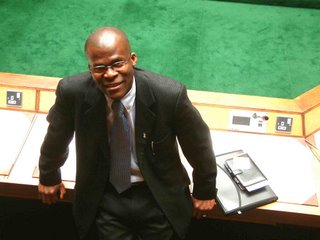
Rotimi Adebari’s focus is on the community of Portlaoise. Arriving there six years ago from Nigeria, he immediately realised that things operated quite differently to what he was familiar with. So he went about exploring, understanding and ultimately embracing those differences.
Rotimi made it his mission to promote cultural understanding and integration between the Irish and immigrant communities. To do this he set up ‘Optimum Point’, a consultancy which trains companies and educational institutions in cross-cultural awareness. He also completed a Masters in Intercultural Studies from Dublin City University, while at the same time running in the local Town Council elections. He was successful in both, and is now one of the very few elected representatives in Ireland representing the immigrant communities.
Once a week Rotimi also hosts a radio programme on Midlands 103FM. The programme discusses social inclusion issues, and aims to inspire those who may be experiencing isolation, whatever their background. Each week he welcomes ‘A Hero from Zero’- a person who has overcome disadvantage or exclusion, to tell their story so others too may realise there is hope.
What keeps him going? Mainly his family. Rotimi has three boys, and another child is on the way. He wants his children to feel at home in Ireland, and indeed wants an Ireland in which those coming into the country feel part of the community, making it their home. ‘I look forward to a future in Ireland’ he says, ‘in which people, irrespective of their colour, creed, religion or nationality, see each other as one’.
And his advice to young people? ‘The sky is the limit. It is getting started that is the big thing. But once you start, you will be changing the world before you know it, and remember, ideas change the world!’
In recognition of all his work, Rotimi recently received a national MAMA media award. The judges on the night of the award ceremony paid special tribute, commending him; ‘For the leadership he has shown. For breaking new ground in the field of political representation. For the creativity and commitment he has applied to creating an integrated intercultural society’.
And his political aspirations? ‘Well’, he says, ‘we will see how it goes over time, I’m open to opportunities’.
Bring on the opportunities!
Friday, May 05, 2006
Mission Possible- Who is Caroline Casey?

Caroline doesn’t like being called ‘inspirational’, but she can inspire. She doesn’t like been called ‘exceptional’, but she is leading an exceptional life. She doesn’t like taking ‘No’ for answer, so she generally doesn’t.
I could list off all the things she has done and achieved, but that may make her seem arrogant. She’s not. Surrounding her is energy, passion, commitment and belief. All of this is channelled into a firm conviction that people, whoever they are, whether young, old, Irish, female, male, black, white, disabled, healthy, sick, whoever, wherever, have ABILITY, and huge pots of potential.
Caroline runs a lot. When I rang up her PA to arrange the interview, she told me Caroline would probably run to the meeting. Caroline indeed is a woman in a hurry to fulfill a mission.
Her mission? Exactly the above; showing that people have ability.
Caroline, by the way, is legally blind, which means that she can see about two or three blurry feet in front of her. She doesn’t let it stop her; at least it didn’t stop her trekking across India on the back of an elephant. It didn’t stop her setting up the Aisling Foundation, an organisation she founded to help her achieve her mission. It didn’t stop her establishing the O2 Ability Awards. It didn’t stop her travelling ‘Around the World in 80 Ways’. It didn’t stop her completing ‘Challenge 32’ (running 32 eight minute miles, in Ireland’s 32 countries, in 32 hours).
You get the message, she’s not easily stopped.
Interestingly, Caroline’s parents never told her she was disabled. It was only when she was 17 and wanted to apply for her driver’s license did she realise that her sight (or lack of it) would pose significant problems. Not being labelled as disabled meant she believed she could do anything she wanted. She had dreams.
‘But if I had been labelled as a disabled child’ she said, ’you don’t get dreams, you are not allowed them; to be a ballet star, or to be a footballer or whatever. Disabled children don’t get that opportunity because so much ‘no’ is attached to them, because we don’t understand them, and people fear’.
She doesn’t suggest that people shouldn’t be told about their disabilities, but she does encourage dreams, including her own.
The 02 Ability Awards came out of the dream that corporate Ireland could be rewarded for how companies integrate disability into the workplace. The awards are about getting companies to understand how individuals can contribute as employees. They also create healthy competition in the sector for good practice. If company ‘A’ is given a televised national award, then company ‘B’ is encouraged to aim for it the following year. Being awarded for being the best brings competitive advantage; so competing in the Awards is good for business all round. In just three years, the Ability Awards have gone from an idea, into something which is dramatically challenging and changing corporate practices in Ireland.
One of Caroline’s next dreams is to bring the Ability Awards internationally. She also has a dream to set up an Elephant Sanctuary in India, a place where children with disabilities can go to gain confidence in their own potential (she has purchased the land, and a hotel chain has agreed to build the sanctuary, and is now trying to raise $175,000 to make the rest happen).
But that is not all. She is also working on a high profile media campaign to put disability on the international agenda, to give a voice to the 400 million people in developing countries with disabilities, who are generally hidden for the media and government eye. ‘If you have a disability and you are poor, you’re the poorest of poor. If you have a disability and you want to get education, you can’t. If you are disabled, and you’re a woman, and you’re poor, you are f***ed!’
‘Where are these people?’ she asks.
With Caroline on board, we are soon to find out.
Thursday, May 04, 2006
The motivating magnet.

This journey started life as a fridge magnet. I never knew that a three inch square could be so powerful. On it was written the following;
'‘Whatever you can do, or dream you can, begin it. Boldness has genius, power and magic in it'’. {goethe}
There it was, the idea, staring at me for months, reinforced with each opening of the fridge.
Every cup of tea, every late night snack, every answered rumble of my belly contributed to making this journey happen. My waist-line may have expanded a bit, but at least the journey is happening.
So I'm going to be including the occassional quote on this site. The ones which get me thinking, motivate me, or keep me going back to the fridge for more.
Hope you enjoy.
Wednesday, May 03, 2006
Releasing Life's Potential- Who is Tara Cunningham?
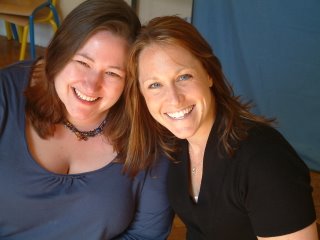
(Tara Cunningham- Right, Jennifer Wetter- Left)
"You do it. You're Tara J. Liston. Go figure it out'’.
That was the reply Tara's fiancee, now husband, gave her when she asked, '‘Why doesn't anybody do something?'’.
So she did, and she certainly seems to be figuring it out.
The 'something' in question was the lack of speech language therapy services in Ireland. Tara’s response was to set up an organisation called Release (www.release.ie), which aims to provide holistic care and education to children with language difficulties, and also, critically, training to their families.
There were many interesting things about Tara’s story. One which impressed me the most was the fact that despite not having a background in Language Therapy, she still went ahead with setting up the organisation. She knew she had enough managerial, business and marketing experience to start and she trusted enough to find the right people along the way to fill in the gaps. One of those is Jennifer Wetter, a qualifed speech therapist from the States, who I also met the day I visited. There are so few speech therapists in Ireland, Tara was conscious not to deprive the Irish health care system of potential employees. So instead she looked Stateside to find a suitable candidate. Tara and Jen work as fuel and engine; and it is hard to really know which is which!
Tara is one to watch. Still in her early 30'’s, she is someone with huge vision, big plans, and the energy and ability to boot. Watch this space!
The link below provides a bit more information.
http://www.socialentrepreneurs.ie/home/social_entrepreneurs/awardees/
The Very Special Olympics- Who is Mary Davis?
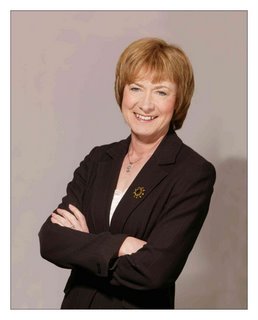
Summer 2003, Dublin, Ireland.
I remember it well, not for the summer heat (this is Ireland after all), but for a flurry of yellow, blue, red and green raincoats that swarmed Dublin city for two weeks in July.
The raincoats belonged to the 30,000 volunteers and support staff and the 7,000 athletes that made the Special Olympic Summer Games the spectacular that it was.
It was the first time the games were hosted outside of the United States. 150 countries were represented. 177 towns, cities and villages across Ireland hosted delegates in the week preceeding the games (Even today, driving though the country, you will still see the host country welcome signs). U2 played at the opening ceremony, and Nelson Mandela also happened to turn up. Those two weeks were a bit of magic and the woman behind it all was Mary Davis, CEO of the Games.
When the games were over, the work was just beginning. The games put disability on the agenda in Ireland, and now the task was to keep it there.
Mary is currently CEO of Special Olympics Ireland, whose mission is to provide year round sports training and competition for people with learning disabilities. In doing so, Special Olympics Ireland provides opportunities for individuals to volunteer, develop strength and courage, experience community, share skills, gain confidence, and a whole host of other immeasurable, wonderful factors.
During the interview Mary provided me with one of the best definitions of social entrepreneurship I have heard. On asking whether she would consider herself a social entrepreneur she said;
'Yes, I would now, because when you look at a successful entrepreneur and what they do, they are usually quite creative in terms of their business, and they are also quite focused and financially astute. They are people who go after something, and they have unshakeable confidence and determination. So they have all the things that you need to have to do something like that as well. The difference is that one is working in an organisation that creates profit, and the other is working in an organisation that doesn'’t create financial profit, but it does create huge social profit. In some ways that it even more rewarding.
The whole idea of making a difference in someone else'’s life; well can you get anything that matches that? Is there anything in the world that matches that?'
Back to Summer 2003, thankfully the raincoats were not needed that much, but the people underneath them have transformed the way service, voluntarism and ability are being perceived in this country, and each in their own way is keeping it on the agenda.…
Find out more:
http://www.specialolympics.ie/en/
Funny Business: Who is Johnny K?
Johnny has that knack of making you laugh within moments of meeting him. On the day he came to my apartment, he pretended to walk into a door. Not suprising then that he is a trained clown.
Johnny has toured post-conflict countries, such as Bosnia and Romania, with comedy and circus shows. Most recently he brought a tour to post-tsunami Sri Lanka. En route, he teaches circus skills to local people, believing in the power of laughter to heal divides.
Johnny now uses his clowing skills to promote multi-cultural awareness in primary schools in Ireland. Responding to increasingly diverse classrooms, he said,
'I want to enlighten Irish children to people who are coming into their areas, to put them in these peoples shoes and show them what it would be like for them, irrespective of where they come from, whether a refugee or not. I basically talk about my experience of refugees in their own countries, and explain what it is like to be a refugee today'
I asked him what advice he would have for young people starting off on their careers, and without hesitation he stated;
'GET OUT OF THE POND. TRAVEL'.
By leaving Ireland, new opportunities and perspectives opened up to him, and from his travels he gained the experience necessary to develop the Schools Cap programme.
You can find out more about Johnny on http://www.socialentrepreneurs.ie/
Preparing for Take-Off
Planning stations are on full blast in Dublin. My departure to Kenya is in just three weeks. There is lots to do in advance of the trip; the usual- tickets, vaccinations, visas, figuring out routes, making contacts with interviewees around the globe, hellos, goodbyes and, the part I least like, lots of filling in forms!
The route and timing is taking shape. I've joined a very interesting on-line forum, where people all around the world are rallying behind the idea, www.omidyar.net
I've had offers of home cooked meals from Kampala to Boston, and it is great to know that there are so many people willing to support me. THANKS TO ALL.
Over the last few weeks, I've also been travelling around Ireland meeting a fantastic group of social entrepreneurs working in Ireland. Included (as individual posts) is a brief introduction to each of them. I have included a link to their organisation where available.

